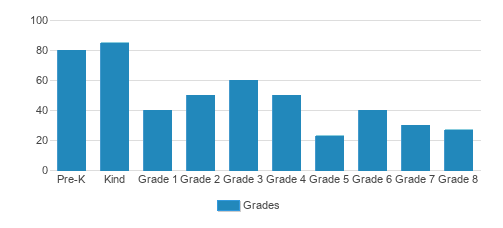St. Thomas More School serves 485 students in grades Prekindergarten-8. The student:teacher of St.
Thomas More School is 23:1 and the school's religious affiliation is Catholic.
Quick Stats (2025)
- Top Ranked NE School
- Grades: Prekindergarten-8
- Enrollment: 485 students
- Acceptance rate: 100%
- Average class size: 16 students
- Application Deadline: None / Rolling
- Source: National Center for Education Statistics (NCES)
Top Rankings
St. Thomas More School ranks among the top 20% of private schools in Nebraska for:
School Overview
Religious Affiliation
Grades Offered
Grades Prekindergarten-8
Student Body
Total Students
485 students
Student Body Type
Co-ed
% Students of Color
43%
State avg.: 21%
Students by Grade

Academics and Faculty
Total Classroom Teachers
21 teachers
Student : Teacher Ratio
23:1
National avg.: 13:1
Average Class Size
16 students
Classroom Dress Code
Casual
Tuition and Acceptance Rate
Admission Deadline
None / Rolling
Acceptance Rate
100%
National avg.: 85%
Source: National Center for Education Statistics (NCES)
Frequently Asked Questions
What is the acceptance rate of St. Thomas More School?
The acceptance rate of St. Thomas More School is 100%, which is higher than the national average of 93%.
What is St. Thomas More School's ranking?
St. Thomas More School ranks among the top 20% of private schools in Nebraska for: Highest percentage of students of color and Largest student body.
When is the application deadline for St. Thomas More School?
The application deadline for St. Thomas More School is rolling (applications are reviewed as they are received year-round).
In what neighborhood is St. Thomas More School located?
St. Thomas More School is located in the South Central Omaha neighborhood of Omaha, NE. There are 8 other private schools located in South Central Omaha.
School Reviews
Endorse St. Thomas More School. Endorsements should be a few sentences in length. Please include any comments on:
- Quality of academic programs, teachers, and facilities
- Availability of music, art, sports and other extracurricular activities
- Academic or athletic awards
Recent Articles

A Parent's Guide To Understanding High School Teaching Methods
This comprehensive guide helps parents navigate the various teaching methods used in today's high school classrooms. By understanding these approaches, you'll be better equipped to support your teen's learning journey, communicate effectively with teachers, and create a complementary learning environment at home.

February 08, 2025
Social Emotional Learning: Education's Hidden SymphonyA musician's perspective on Social Emotional Learning reveals how this educational framework orchestrates success through five essential emotional competencies.

January 24, 2025
A Roadmap For Starting A Private SchoolUse this roadmap as a set of talking points with your trusted mentors and professionals to start the private school of your dreams. You're not alone. Over the years, hundreds of folks like you have had the same dream. From Quintilian to Maria Montessori to Lucy Madeira Wing, visionary educators have established schools to teach according to their beliefs and methodologies.














